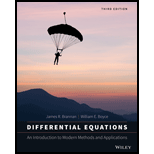
Concept explainers
Assume that conditions are as in Problem
Find the maximum height above the ground that the ballreaches.
Find the time that the ball hits the ground.
Plot the graphs of velocity and position versus time. Compare these graphs with the corresponding ones in Problems
Want to see the full answer?
Check out a sample textbook solution
Chapter 2 Solutions
Differential Equations: An Introduction to Modern Methods and Applications
Additional Math Textbook Solutions
Elementary Statistics (13th Edition)
Probability And Statistical Inference (10th Edition)
Elementary Statistics
Graphical Approach To College Algebra
College Algebra (7th Edition)
- One hundred people were surveyed, and one question pertained to their educational background. The results of this question and their genders are given in the following table. Female (F) Male (F′) Total College degree (D) 30 20 50 No college degree (D′) 30 20 50 Total 60 40 100 If a person is selected at random from those surveyed, find the probability of each of the following events.1. The person is female or has a college degree. Answer: equation editor Equation Editor 2. The person is male or does not have a college degree. Answer: equation editor Equation Editor 3. The person is female or does not have a college degree.arrow_forwardPlease draw a detailed grapharrow_forwardFor allarrow_forward
- not use ai pleasearrow_forward3) Let G be the group generated by elements a and b satisfying the relations a² = 63, 66 = 1, and a ¹ba = b¹. Which of the following is equivalent to the element z = a a-2ba3b3? A) b-2a-1 B) ab² C) ab D) ba E) b²aarrow_forward1) Find all complex solutions to cos(z) =arrow_forward
- 3) Compute where C is the circle |z― i| = - 1 2 2+1 Po z z - 2)2 dz traversed counterclockwise. Solution: TYPE YOUR SOLUTION HERE! INCLUDE A SKETCH OF THE COM- PLEX PLANE AND THE CURVE C. ALSO, MARK ALL SINGULARITIES OF THE INTEGRAND!arrow_forward2) Consider the function f (z = re²) = e cos(In(r)) + ie¯* sin(ln(r)). Show that is holomorphic at all points except the origin. Also show that =arrow_forward3) If a is a positive number, what is the value of the following double integral? 2a Love Lv 2ay-y² .x2 + y2 dadyarrow_forward
- 2) Consider the set SL(n, R) consisting of n x n matrices with real entries having de- terminant equal to 1. Prove that SL(n, R) is a group under the operation of matrix multiplication (it is referred to as the Special Linear Group).arrow_forward1) What is the parity of the following permutation? (1389) (24) (567)arrow_forward4.7 Use forward and backward difference approximations of O(h) and a centered difference approximation of O(h²) to estimate the first derivative of the function examined in Prob. 4.5. Evaluate the derivative at x = 2 using a step size of h = 0.2. Compare your results with the true value of the derivative. Interpret your results on the basis of the remainder term of the Taylor series expansion.arrow_forward

 Mathematics For Machine TechnologyAdvanced MathISBN:9781337798310Author:Peterson, John.Publisher:Cengage Learning,
Mathematics For Machine TechnologyAdvanced MathISBN:9781337798310Author:Peterson, John.Publisher:Cengage Learning, College Algebra (MindTap Course List)AlgebraISBN:9781305652231Author:R. David Gustafson, Jeff HughesPublisher:Cengage Learning
College Algebra (MindTap Course List)AlgebraISBN:9781305652231Author:R. David Gustafson, Jeff HughesPublisher:Cengage Learning Trigonometry (MindTap Course List)TrigonometryISBN:9781305652224Author:Charles P. McKeague, Mark D. TurnerPublisher:Cengage LearningAlgebra & Trigonometry with Analytic GeometryAlgebraISBN:9781133382119Author:SwokowskiPublisher:Cengage
Trigonometry (MindTap Course List)TrigonometryISBN:9781305652224Author:Charles P. McKeague, Mark D. TurnerPublisher:Cengage LearningAlgebra & Trigonometry with Analytic GeometryAlgebraISBN:9781133382119Author:SwokowskiPublisher:Cengage Trigonometry (MindTap Course List)TrigonometryISBN:9781337278461Author:Ron LarsonPublisher:Cengage Learning
Trigonometry (MindTap Course List)TrigonometryISBN:9781337278461Author:Ron LarsonPublisher:Cengage Learning





